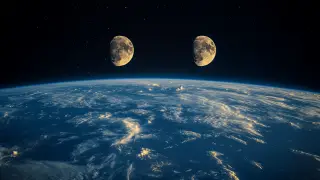Tengrinews.kz - Earth will temporarily acquire a second "Moon" at the end of September 2024, when a small asteroid enters our planet's orbit.
According to DailyMail, the space object, named 2024 PT5, will be under the influence of Earth's gravitational field for about two months — from September 29 to November 25. The asteroid, approximately 10 meters in diameter, was first discovered on August 7, 2024, using the ATLAS system, which is designed to track asteroids that pose a threat to Earth. Researchers analyzed its trajectory and found that the asteroid will make one orbit around our planet before moving on to other regions of the solar system.
Newly-discovered #asteroid 2024 PT5 is about to undergo a "mini-moon event" when its geocentric energy becomes negative from September 29 - November 25.https://t.co/sAo1qSRu3J pic.twitter.com/pVYAmSbkCF
— Tony Dunn (@tony873004) September 10, 2024
This temporary satellite falls into the category of so-called "mini-moons." These are small celestial bodies that are briefly captured by Earth's gravitational field. Asteroid 2024 PT5 poses no danger to our planet; its trajectory is well studied, and it will continue its movement through space after its short visit to Earth.
Researchers have also determined that 2024 PT5 likely originates from a group of asteroids known as the Arjuna belt. These are small asteroids with orbits close to Earth's orbit. However, there is an alternative hypothesis: according to Paul Chodas, director of the Center for Near Earth Object Studies at NASA, the asteroid might be a fragment knocked off the surface of our Moon as a result of some impact.
It's worth noting that not all scientists agree on classifying this object as a full-fledged "mini-moon." For an asteroid to earn this status, it must complete at least one full orbit around Earth. Some experts believe that 2024 PT5 may not complete a full orbit during its stay in Earth's orbit. Time will tell.
Nevertheless, such temporary satellites remind us of the constantly moving celestial bodies near our planet and the importance of studying their trajectories.
Read also: Tourists enter open space live for the first time in history

